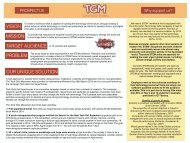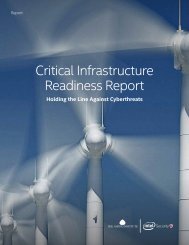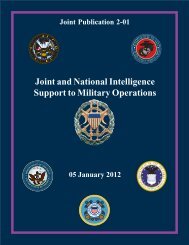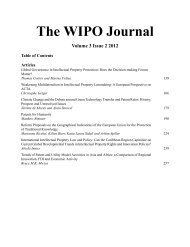Transparency Initiative (EITI)
2eoch1l
2eoch1l
You also want an ePaper? Increase the reach of your titles
YUMPU automatically turns print PDFs into web optimized ePapers that Google loves.
71<br />
8.4 CONCLUSION<br />
Although the DRC has only been <strong>EITI</strong> compliant since July<br />
2014, its history with the process is considered in <strong>EITI</strong> publications<br />
as one of the most advanced. Having published reports<br />
from 2007 onwards, with the 2015 Report to be published<br />
in late 2016, the MSG, the National Committee and<br />
stakeholders particularly in the government and the private<br />
sector have objectively improved greatly in reporting<br />
efficiency. Data collection has been reduced from one year<br />
down to four months as stakeholders become accustomed<br />
to what is required and approval from within their constituencies<br />
(e.g. company lawyers). With the <strong>EITI</strong> Report’s lag<br />
time decreased to nine months after the end of the fiscal<br />
year and coinciding with the budget discussions, the 2015<br />
Report may lead to a step change in the country.<br />
The DRC process has almost no hard evidence and statistical<br />
basis to judge whether <strong>EITI</strong> has been successful in the<br />
country. The trajectory is no doubt tending upwards, particularly<br />
taking into account the situation one decade ago,<br />
however its degree is unclear. Anecdotal evidence from major<br />
players in the government, civil society and the private<br />
sector all point to positive movement, but with much work<br />
to be carried out.<br />
More reliable hard evidence exists in the transformation of<br />
processes and systems within the government. The Auditor<br />
General’s office is considerably stronger than several years<br />
ago. One tax identification exists for each company. Focal<br />
points exist within the various government ministries, so<br />
as one interviewee said “something is happening” and “it is<br />
considerably better” than before the <strong>EITI</strong> process began.<br />
the population at large, which would serve as a baseline to<br />
judge progress. The GIZ funded a survey of the <strong>EITI</strong> process,<br />
with interviews, which is a good beginning, but donors,<br />
supporters, and in-country implementers need to take results<br />
more seriously.<br />
The <strong>EITI</strong> in the DRC still has more potential than results.<br />
What is important now is to take measurement far more<br />
seriously, using the proposed theory of change above as a<br />
basis, with the consultation of the National Secretariat and<br />
MSG. With the theory of change, a detailed strategy and a<br />
detailed plan of action, it is hoped that evaluating the impact<br />
will be more concrete and measurable in the future,<br />
leading to a more positive change in the lives of the country’s<br />
70 million people. Indeed, if there is no headway made<br />
in the next five years, the process will be a shell, a process<br />
that looks good on paper, but does not meet the country’s<br />
real needs. In respect of political rights, the DRC is raising<br />
concerns among international observers; it has been put on<br />
the Freedom House list of the “countries to watch in 2016”,<br />
and if the <strong>EITI</strong> is more closely linked to the expected turning<br />
points in DRC’s democratic trajectory and can contribute<br />
to special scrutiny of political economy, it can make the<br />
<strong>EITI</strong> more relevant.<br />
One of the <strong>EITI</strong>’s main objectives is to be relevant in the<br />
country. The natural resource discussion is taking place<br />
among elites, but it has yet to “catch flame” throughout the<br />
population. For this reason, the proposed theory of change<br />
concentrates on major constituencies which play a key<br />
role in the country, but as of yet have not been (in this consultant’s<br />
view) significantly engaged or engaged enough to<br />
bring about the public debate.<br />
The National Secretariat and the MSG carry out a number<br />
of trainings, but with no statistics around what those<br />
trainings have accomplished, beyond anecdotal positives,<br />
it is impossible to evaluate any impact. With compliant status<br />
only reached in mid-2014, it is too early and “evidence”<br />
is anecdotally based. Establishing causality for many aspects<br />
of ITIE’s work is too difficult. Therefore, it would be<br />
very useful to have a close-ended survey for both elites and









